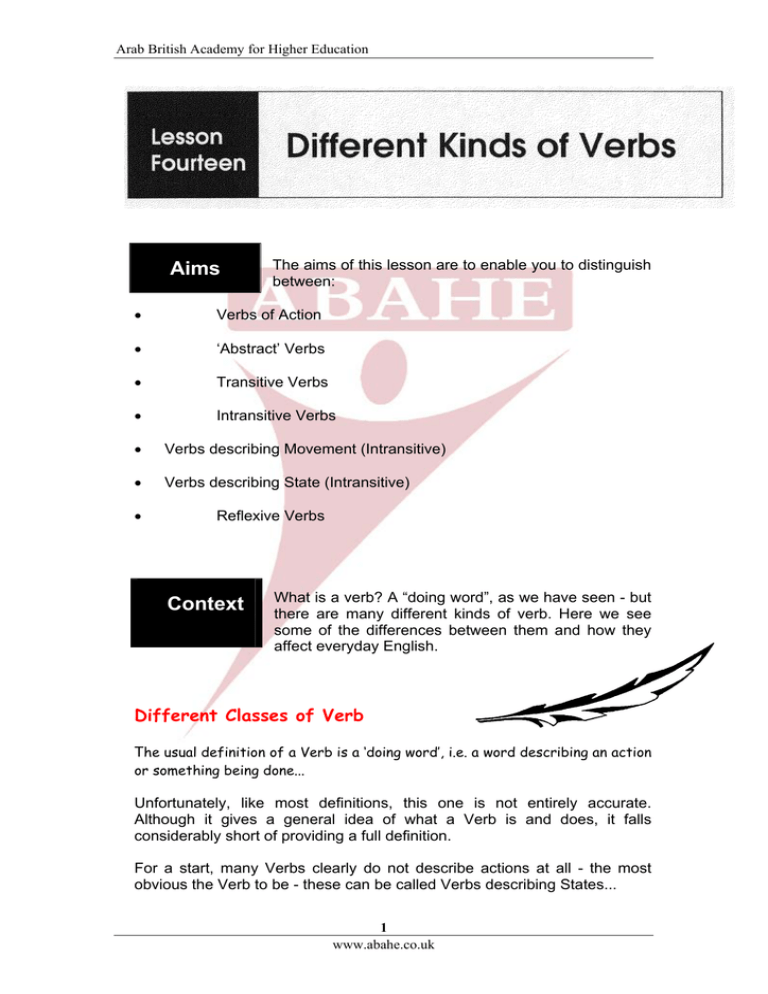
Arab British Academy for Higher Education
Aims
The aims of this lesson are to enable you to distinguish
between:
Verbs of Action
‘Abstract’ Verbs
Transitive Verbs
Intransitive Verbs
Verbs describing Movement (Intransitive)
Verbs describing State (Intransitive)
Reflexive Verbs
Context
What is a verb? A “doing word”, as we have seen - but
there are many different kinds of verb. Here we see
some of the differences between them and how they
affect everyday English.
Different Classes of Verb
The usual definition of a Verb is a ‘doing word’, i.e. a word describing an action
or something being done...
Unfortunately, like most definitions, this one is not entirely accurate.
Although it gives a general idea of what a Verb is and does, it falls
considerably short of providing a full definition.
For a start, many Verbs clearly do not describe actions at all - the most
obvious the Verb to be - these can be called Verbs describing States...
1
www.abahe.co.uk
Arab British Academy for Higher Education
There are also quite a few Verbs which do describe an Action, but this is
not very clear: the Verbs to have and to possess are examples of this kind
(I call them Abstract Verbs...)
Verbs can be called Transitive and Intransitive, and in this Section we see
exactly what is meant by these terms.
Finally there are Reflexive Verbs that we have looked at earlier, (Lesson
Eleven) but it would be useful to have another look in the context of
different types of Verbs.
We do not intend to look in detail at the tenses and moods of these
verbs (For these please refer to the earlier lessons in this course,
or the recommended grammar books, An A-Z of English Grammar
and Usage and the Oxford Guide to English Grammar.
In separate Sections we shall look briefly at each type of
Verb, and you will have an Activity with each to make sure
you understand the differences between them. The Key as
usual is to be found after this Lesson
Verbs of Action
These are the most obvious verbs, and most similar to their definition as
doing words.
Examples
To speak, to eat, to write, to walk, to lift etc
These are just random examples, but each of them describes an action that
is clear and perceptible through at least one of the senses:
to speak
hearing; to eat
various senses; to write
various senses, etc.
Activity
1
Complete the following sentences with a Verb showing a
visible action: there may be more than one Answer; try to use
the appropriate tense: you may have to check Past Tenses
earlier in the Course:
a)
At school we _____ our exercises on A4 paper
2
www.abahe.co.uk
Arab British Academy for Higher Education
b)
When I woke up this morning, the sun _____
_____ through the window (Imperfect Tense)
c) Every morning, the children _____ the bus to go to school
d) Mother _____her child stories before she goes to bed.
e) If I'd known you were coming, I'd _____ a cake.
‘Abstract’ Verbs
‘Abstract’ Verbs do not describe visible actions, the most important one is
‘to be’, not only Abstract but it describes a State. (See later Section in this
Lesson for Verbs describing States); here are some examples:
to have, to know, to believe, to think, to seem, to learn
Examples
Peter has a new bicycle; we know this town very well; I believe what I am
told; I think it’s going to rain; it seems to me they are wrong; at college we
learn many things
Activity
2
Complete the following sentences with an appropriate
‘Abstract’ Verb; the Key offers solutions but there may be
others equally correct.
a) We _______ it was going to rain (Past Tense)
b)
here.
_______ you your tickets? Yes, we _______ them
c) I don’t ______ what you are talking about!
d) It_____to Emma the party wouldn’t be much good
e) I wish you _____ ______ from my experience (Use
anything that fits but in the Conditional Tense)
All Rights Reserved © Arab British Academy for Higher Education
3
www.abahe.co.uk








